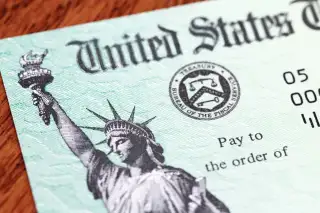Wondering Where Your Tax Refund Is? Here's the IRS Schedule for Sending Out Checks

Where's my tax refund?
That's one of the most common tax questions, and if you are asking that right now, the answer is that your tax refund should be arriving very soon. The IRS processes the vast majority of tax refunds within three weeks of the return being filed.
So last-minute filers who just barely got their taxes done by the April 15 deadline can expect to get a refund within a week or so, if the payment hasn't already arrived via check or direct deposit. That's assuming you didn't file for a tax extension, which would obviously delay any tax refund you are due.
For more specific information about when your federal tax refund will arrive, you can check out the "Where's My Refund" IRS page, which will provide your personal refund status after you enter a social security number and some other details.
The 2019 tax season has been unusually dramatic. People began filing their taxes while there was a federal government shutdown still in effect, when many IRS employees were working without pay or weren't working at all.
Early on in the tax season, average tax refunds were smaller compared to 2018, and that confused and frustrated many people, who expected bigger refunds because of the Tax Cuts and Jobs Act passed by the Trump administration and the GOP. Within a few weeks, though, the average tax refund filed in 2019 had increased — and was slightly higher compared to the same period one year before.
Now that the 2019 tax season is over, we have clearer answers to two big questions on the minds of taxpayers: Did tax refunds increase or decrease in 2019? And are people really paying lower taxes after the GOP tax overhaul, as promised?
What's the Average Tax Refund in 2019?
IRS data released for the week ending on Friday, April 19, shows that the average federal tax refund for the entire 2019 tax season was $2,725. That's down marginally from the average tax refund for 2018: $2,780. The $55 drop in the average refund represents a decline of 2%.
Tax refunds are based on your withholdings: When too much money is withheld for taxes in your paycheck, you are due a refund. In other words, getting a smaller refund is not necessarily an indication your taxes have gone up.
It's also important to understand that even though many people love getting big tax refunds, they should not remotely be considered as free money from the government. Instead, you are due a tax refund check if you have been overpaying taxes to the government throughout the course of the year — and you are merely getting that overpayment back, via a tax refund.
Who Really Got a Tax Cut? Who Is Paying Higher Taxes?
Regardless of the small decline in tax refunds in 2019, most taxpayers are enjoying a tax cut in the aftermath of the Tax Cuts and Jobs Act (TCJA) went fully into effect.
The non-profit Tax Foundation estimated that 80% of tax filers had a lower tax liability during this past year (the first full year for the TCJA cuts), and that only 5% of filers paid higher taxes. Another nonprofit, the Tax Policy Center, says that 64% of households paid less in federal income taxes compared to the year before TCJA was implemented, while 6% paid more in taxes.
However, surveys shows that the perception of who got a tax cut and who faced higher taxes is quite different than the reality of the GOP tax overhaul. In polls conducted during the 2019 tax season by Reuters/Ipsos, Gallup, and the Wall Street Journal and NBC News, relatively few Americans thought they were paying less in taxes — and they were outnumbered by those who thought they were paying higher taxes in every survey.
According to the Wall Street Journal/NBC News poll, for example, only 17% of respondents said they were paying less in taxes after the Trump tax cuts were implemented. Meanwhile 28% said they were paying more in taxes, and the rest of respondents either thought the TCJA didn't change their taxes or didn't know how the overhaul impacted them.